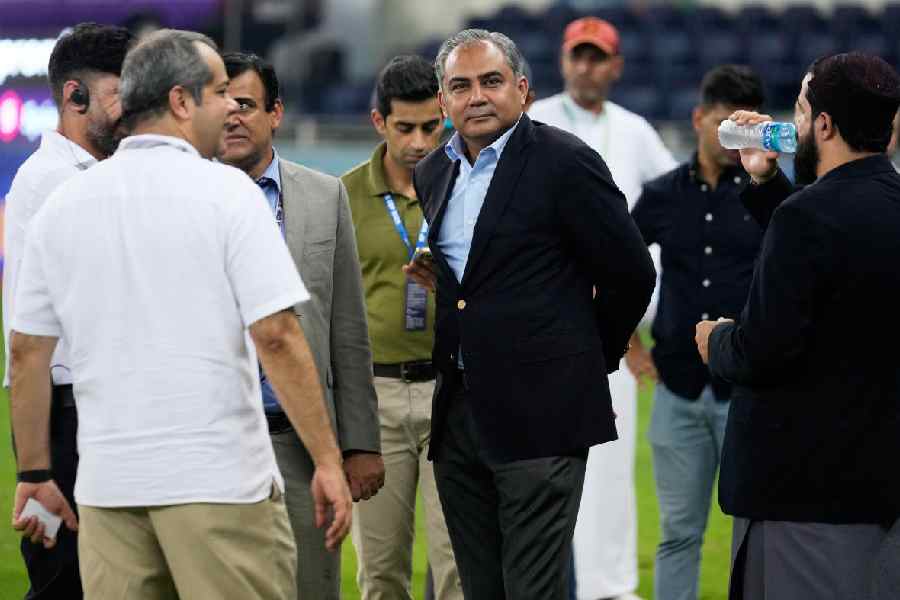 |
Marriages based on caste, class and creed are still the norm. The society is fundamentalist at a basic level
Muslim boy meets Marwari girl. They fall in love. The girl’s family is vehemently opposed to the match. Boy and girl get married and the couple move into the boy’s house. When pleas and threats fail to bring the girl back home, her father calls the cops and ensures that she is sent back to her parents for seven days. Ten days later, the boy is found dead near the railway tracks.
The tragic end to the Rizwanur Rahman-Priyanka Todi affair has once again highlighted the insurmountable barriers that often come to the surface in the case of mixed marriages. Even in these “progressive” times, when matrimonial sites use the word extensively, and in a “progressive” city like Calcutta. Study what you want to, but marry whom we want you to — remains the parental diktat. Or at least someone whom we will approve of. And most children obey their parents. Few defy norms, like Rizwanur and Priyanka, and if they do, they pay a price.
In the Marwari community, the rules are strict. “There is an unwritten law that the marriage of a Marwari boy or girl outside the community is sacrilege. If a girl marries outside the community it sometimes becomes a matter of honour for the parents,” says Ravi Santhalia, a Marwari businessman from Lake Town. Priyanka studying computer graphics was fine; but she could not fall in love and marry her teacher. The community largely feels that the way the Todis dealt with the marriage is unacceptable, but it does not mean that it is ready to accept marrying a Muslim.
It is wrong, however, to think that Marwaris alone resist the idea — it’s the same for all communities, including “liberal”, educated Bengali Hindus. “The Rizwanur incident is the result of a clash between progressive and conservative values, which is present in every society. In this case the approach has been arrogant and inhumane,” says Prabha Khaitan, social worker and author. “But this attitude is not peculiar to one community.”
The limit
While Paroma Bhattacharya (name changed), an IT professional, and Rahil Mirza (name changed), an engineer, both 27 years old, were just friends, the two families would visit each other on social occasions and celebrate festivals together. But everything changed when word was out that they were in love and wanted to get married. Each family accused the other of trying to lure their child. Paroma and Rahil now meet in secret without the knowledge of their parents.
“Romantic marriages are still not the norm in our society. One can find hordes of advertisements for negotiated marriages based on caste and class and at some basic level the society is still fundamentalist. This is why such marriages become an issue,” says sociologist Bula Bhadra.
The money factor
Rizwanur had committed a double crime — he not only belonged to a different community but also to a poorer class (as a computer graphics teacher, he earned Rs 10,000 per month; Ashok, Priyanka’s father, is the owner of Lux Cozi, a Rs 200-crore company). Though even Bollywood has to admit that inter-community marriages, such as the Hindu-Muslim marriage in Bombay or the Gujarati-Tamil marriage in Ek Duje Ke Liye, are problematic, mainstream Indian films are often based on the poor-boy-meets-rich-girl theme and they usually live happily ever after. Real life seems to be different.
In urban societies, after the religious divide, it’s possibly the money factor that matters most. It is not known what the Todis found more objectionable about Rizwanur — his religion or his class. “Religion is not the only problem. We are also extremely class conscious, which adds to the whole issue,” feels Bhadra.
“Most parents want their daughter to marry into a household more affluent than theirs. Especially because the social status and nature of the household endorses their social status,” says Mudar Patherya, a communication consultant.
He should know. Mudar did not have to suffer Rizwanur’s fate, but had acted similarly. A devout Muslim, he married Shalini, a Hindu girl, and faced huge opposition from the girl’s family. It was not just on the basis of religion, but also because of the difference in economic background. “When I got married in 1993, we faced opposition, especially because of the repercussions of the communal riots on the Babri Masjid issue. But the difference in our economic background was also a reason,” he says.
With religion and socio-economic status, caste and region play an important role for an overwhelming majority.
What keeps it going
The Indian sense of tradition. Matrimonial columns in newspapers, even those which come with the tag of “caste no bar”, mention the candidate’s caste. The “cosmopolitan” ads hardly come with the declaration “religion no bar”. It is either Naidu parents looking for a bride or a Baidya girl looking for a groom.
A matrimonial column will have categories on the basis of language, religion, age, caste, community and profession. The search engines of portals like shaadi.com and bharatmatrimony ask the user to enter whether it is a bride or a groom one is searching for, the age of the candidate and the community, with options such as — Hindu: Assamese, Hindu: Bengali, Muslim: Shia, Muslim: Sunni, Christian: Protestant, Christian: Born again. There are even categories like “spiritual”.
Online message boards on marriage as an institution have various responses from young Indians, and most of them are conservative.
“We spoil our tradition if we marry outside our community,” is one of the responses on a message board on rediff.com that deals with the issue of marrying outside the community.
Another post on the board reads: “Inter-religion marriage — not good between certain communities; inter-caste marriage — up to the individual…. religion is a dicey thing.... You will lose everything, your roots, and your anchor in the form of your family and your identity. Don’t do it.... Some communities have never come to accept individual choices, it is better to stay away from them… inter-caste marriage is fine as long as both the boy and girl are okay with it.”
Differences in tastes, customs, value system, are raised as reasons why inter-community marriages should still be considered taboo.
Social repercussions
Parental opposition alone does not make life difficult for the younger generation trying to break out of conservative norms. “It becomes difficult for other brothers and sisters of that girl to get a match in the community,” feels Santhalia. Both the communities also consider children of the couple outsiders.
There are very few support systems in place for such couples. Apart from problems such as not getting places to rent, they also lack a platform where they can be heard.
“There is definitely a lack of dedicated forums for such cases, though many of them go to women’s organisations and other local organisations,” feels Nilanjana Gupta, a coordinator of an NGO called Saman that has dealt with cases of inter-caste and inter-religion marriages.
It is not just marriage that is underlined by communal and caste-based differences — these are deep-rooted beliefs that are part and parcel of the Indian society, feels Gupta. “Platforms for interactions between different communities are still not readily available. As a result biases regarding different communities exist,” she says.
There is a ray of hope, feel some. Response to inter-caste or inter-community marriages is not all negative, feels Gupta. “There is a problem regarding social acceptance by family and neighbours, but it is not always the case,” says Gupta. Initial resistance often gives way to acceptance, once parents see that their children are happy and Mudar and Shalini are an example.
“We have been accepted not only by the immediate family but by the extended family as well,” says Mudar. He and Shalini started the candlelight vigil outside St Xavier’s College for Rizwanur, as a symbol of protest on behalf of the residents of the city.
But it is difficult to feel hopeful while the banality of Rizwanur’s death stalks the city every moment.
(Those wanting to volunteer for the candle-light vigil can call 9874304494 or email justizforriz@gmail.com)










